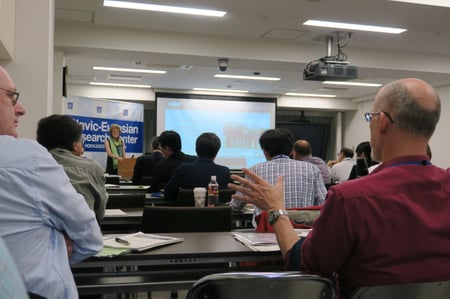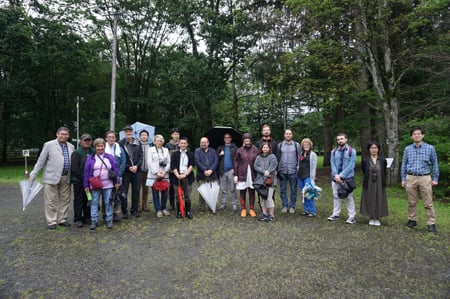The International Symposium, “On Land, Water and Ice: Indigenous Societies and the Changing Arctic” was held on July 5 and 6 at the Slavic-Eurasian Research Center, Hokkaido University. Making a feature of the various changes that confront the indigenous people in the Arctic, the symposium had two keynote speeches on the first day, which were followed by five sessions of presentations over two days.
The first three sessions were organized according to geographical region: 1. Livelihoods and Networks of People in Siberia, 2. The Contemporary Society of Greenland and Its Future, 3. Alaska’s Subsistence Lifestyle. They were followed by two other sessions covering broader themes: 4. Arctic Governance and Knowledge, and 5. History of the Furthest Coast. Every session had three presentations, and thus a total of 17 papers were read including keynote speeches. Three of them were read by researchers or activists representing groups of indigenous people from Siberia, Greenland, and Alaska, respectively. The most widely used approach among the papers was anthropological, followed by historical, geographical, archeological, and policy science. A large symposium can seem incoherent as a whole, in spite of individual papers being excellent. However, in this symposium, each paper connected with other papers of different sessions. For example, the issue of fishing was discussed directly and indirectly in most sessions. The discussions brought to light how fishing, which is very important in the lives of indigenous people, is under siege due to pressure from states and business concerns. How indigenous people are affected by the problems of logistics, including infrastructure such as railways, roads, and the Northern Sea Route, was also discussed in several sessions. Other topics such as how hunting cultures make use of the nature around them, and the problems of state governance of localities and indigenous people’s subsistence, evoked common interest extending over sessions. These discussions clarified how indigenous people in the Arctic are facing challenges not only of climate change, but also of the imposition of state regulations, world economic trends, and European and American standards. At the same time, other papers examined how indigenous people are starting projects to preserve their own traditional linguistic culture, and the strategies they are deploying in everyday life to make good use of given resources, no matter how they were originally used, revealing the resilience of the indigenous people who are living through these changing times.
Masanori Goto (Hokkaido University / a member of Theme 7)






